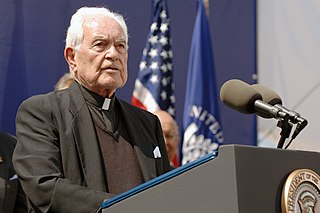A Quote by William A. Dembski
I think the opportunity to deal with students and getting them properly oriented on science and theology and the relation between those is going to be important because science has been such an instrument used by the materialists to undermine the Christian faith and religious belief generally.
Related Quotes
I have a friend — or had a friend, now dead — Abdus Salam, a very devout Muslim, who was trying to bring science into the universities in the Gulf states and he told me that he had a terrible time because, although they were very receptive to technology, they felt that science would be a corrosive to religious belief, and they were worried about it… and damn it, I think they were right. It is corrosive of religious belief, and it’s a good thing too.
Science has only two things to contribute to religion: an analysis of the evolutionary, cultural, and psychological basis for believing things that aren't true, and a scientific disproof of some of faith's claims (e.g., Adam and Eve, the Great Flood). Religion has nothing to contribute to science, and science is best off staying as far away from faith as possible. The "constructive dialogue" between science and faith is, in reality, a destructive monologue, with science making all the good points, tearing down religion in the process.
The most interesting character to me is someone who is stuck in the no man's land between Belief and Unbelief, Faith and Faithlessness. I'm capitalizing like a German, but it doesn't matter whether it's faith in a person or in God, or belief in science or whatever, it's the desperate in-between state that makes for interesting dramatic tension.
Trouble arises when either science or religion claims universal jurisdiction, when either religious dogma or scientific dogma claims to be infallible. Religious creationists and scientific materialists are equally dogmatic and insensitive. By their arrogance they bring both science and religion into disrepute.
Science is better paid than at any time in the past. The results of this pay have been to attract into science many of those for whom the pay is the first consideration, and who scorn to sacrifice immediate profit for the freedom of development of their own concept. Moreover, this inner development, important and indispensable as it may be to the world of science in the future, generally does not have the tendency to put a single cent into the pockets of their employers.
Those whose thinking is disciplined by science, like all others, need a basis for the good life, for aspiration, for courage to do great deeds. They need a faith to live by. The hope of the world lies in those who have such faith and who use the methods of science to make their visions become real. Such visions and hope and faith are not a part of science.
The necessary precondition for the birth of science as we know it is, it would seem, the diffusion through society of the belief that the universe is both rational and contingent. Such a belief is the presupposition of modern science and cannot by any conceivable argument be a product of science. One has to ask: Upon what is this belief founded?
For this knowledge of right living, we have sought a new name... . As theology is the science of religious life, and biology the science of [physical] life ... so let Oekology be henceforth the science of [our] normal lives ... the worthiest of all the applied sciences which teaches the principles on which to found... healthy... and happy life.
The capacity for the accomplishment of religious virtuosos the "intellectual sacrifice" is the decisive characteristic of the positively religious man. That this is so is shown by the fact that in spite of (or rather in consequence) of theology (which unveils it) the tension between the value-spheres of "science" and the sphere of "the holy" is unbridgeable.









































